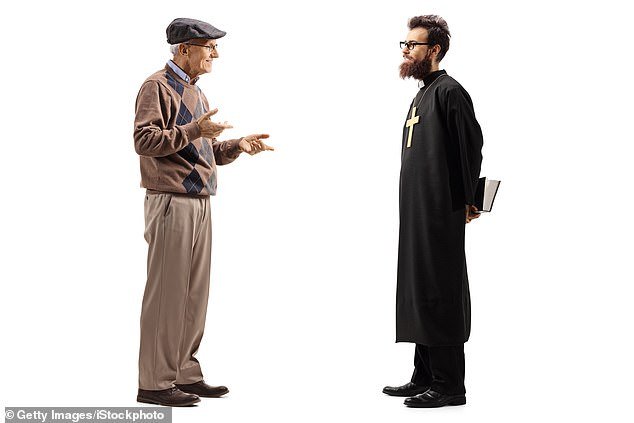Are atheists immoral because they don’t believe in God?
It’s a commonly held stereotype, but a new study suggests they’re no less principled than religious people.
Researchers found non-believers and believers shared similar views on fairness and not hurting people.
But the atheists didn’t see values that supported unity, like loyalty and respect for authority, were essential to be moral.
Non-believers also tended to think more about the consequences of an action when deciding if something was moral or not, and were more likely to make a judgment on a case-by-case basis.
That suggests they have a moral compass that’s ‘calibrated somewhat differently’ than religious people, who are more focused on the group.
Atheists and religious people share principles about kindness and not hurting people, researchers found. But nonbelievers are less likely to see values that promote group unity, like respect for authority figures and loyalty, as essential to being moral
Tomas Ståhl, a professor of psychology at University of Illinois Chicago, analyzed several cross-national surveys comparing the US, a relatively religious country, and Sweden, one of the most secular countries in the world.
He found atheists and believers in both nations shared similar values about fairness and not hurting vulnerable people.
But the atheists didn’t think values that promoted ‘group cohesion’— including loyalty, sanctity and respect for authority — were all that important to being a moral person.
Non-believers in both countries were also more likely to think about the harm done by action versus inaction when deciding if something was morally justifiable.

In an examination of several cross-national surveys from Sweden and the US, religious people were more likely to see the world as a dangerous place than atheists. That may explain why they put more weight on values that protect the group from outside threats
‘Disbelievers do have a moral compass,’ Ståhl said. ‘However, it is calibrated somewhat differently than that of religious believers in some respects.’
Atheists’ different moral system may be the source of negative stereotypes about them being immoral, Ståhl added.
Religious people in both countries were also more likely than non-believers to feel the world is dangerous place.
That could explain why aspects of morality that protect the group are more important to them, Ståhl theorized, and cause them to question those who don’t feel the same way.
‘Different levels of perceived existential threat can be a partial explanation to why believers and disbelievers have somewhat different moral values,’ he said.
The study, published in PLOS ONE, was funded by the Understanding Unbelief Program at the University of Kent.
It comes on the heels of a slew of research dispelling stereotypes about atheists.
A 2019 study from Understanding Unbelief found a majority of so-called non-believers still believed in the supernatural.
Researchers interviewed thousands of atheists and agnostics from the U.K., the U.S., Japan, Brazil, Denmark, and China
The most commonly accepted beliefs among atheists and agnostics are that there are ‘underlying forces’ of good and evil in the world; that there is ‘a universal spirit or life force,’ and that ‘most significant life events are meant to be and happen for a reason.’
A little under 20 percent of American atheists reported believing in ‘supernatural beings.’
None of the atheists were overwhelmingly ‘naturalist,’ researchers said, meaning rejecting all supernatural ideas.
‘In none of our six countries surveyed does the percentage of unbelievers who qualify as naturalists approach 50 [percent],’ they said.
‘Even among American atheists, the most naturalistic group across our surveyed countries, only a third seem to have a wholly naturalistic world view.’
And atheists appear to be kinder in their treatment of Christians than Christians are to nonbelievers.
Researchers at Ohio University asked participants to share monetary rewards with partners in a version of the Dictator Game, where one participant is given money and must offer an amount to a second person, even if that is telling them they will receive nothing.
When atheists were told of the second person’s beliefs on religion, they behaved the same toward both atheists and Christians.
Christians, meanwhile, consistently favored their fellow believers.
